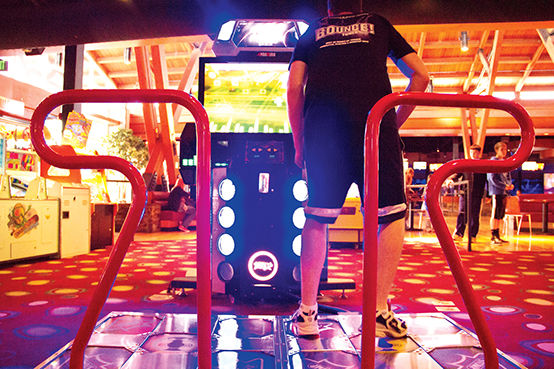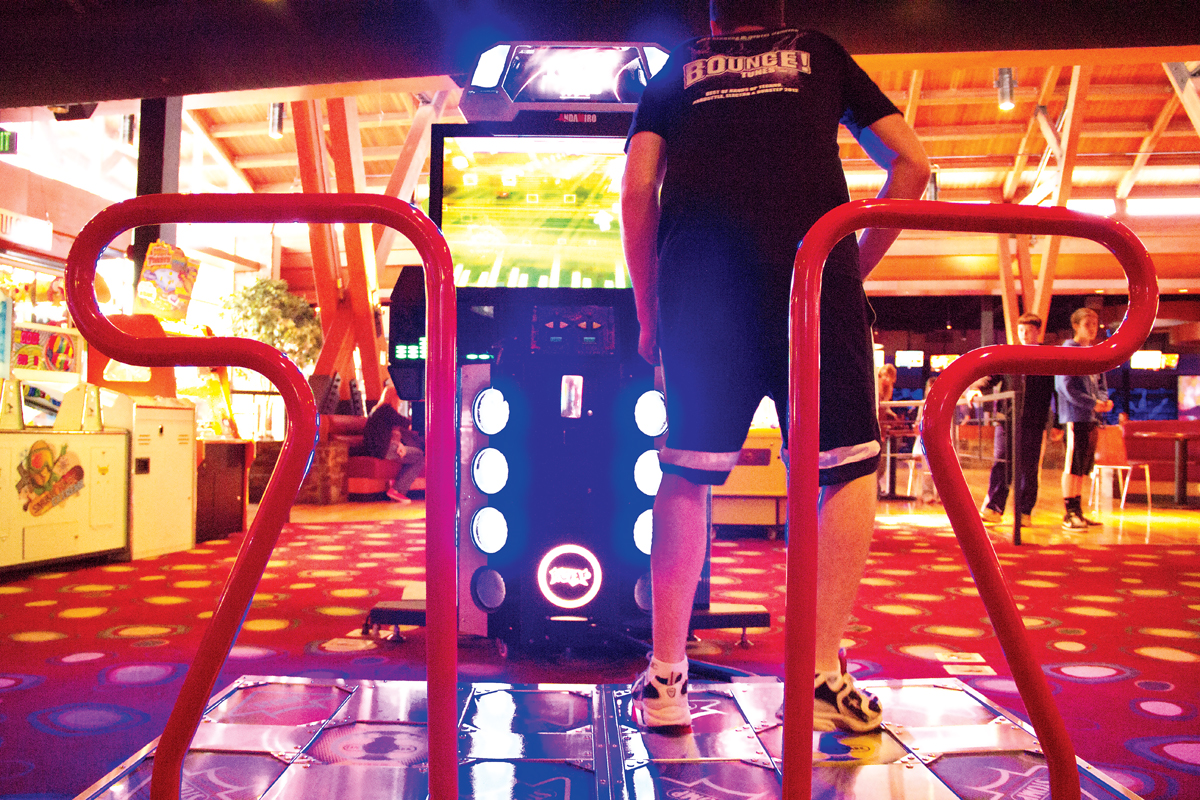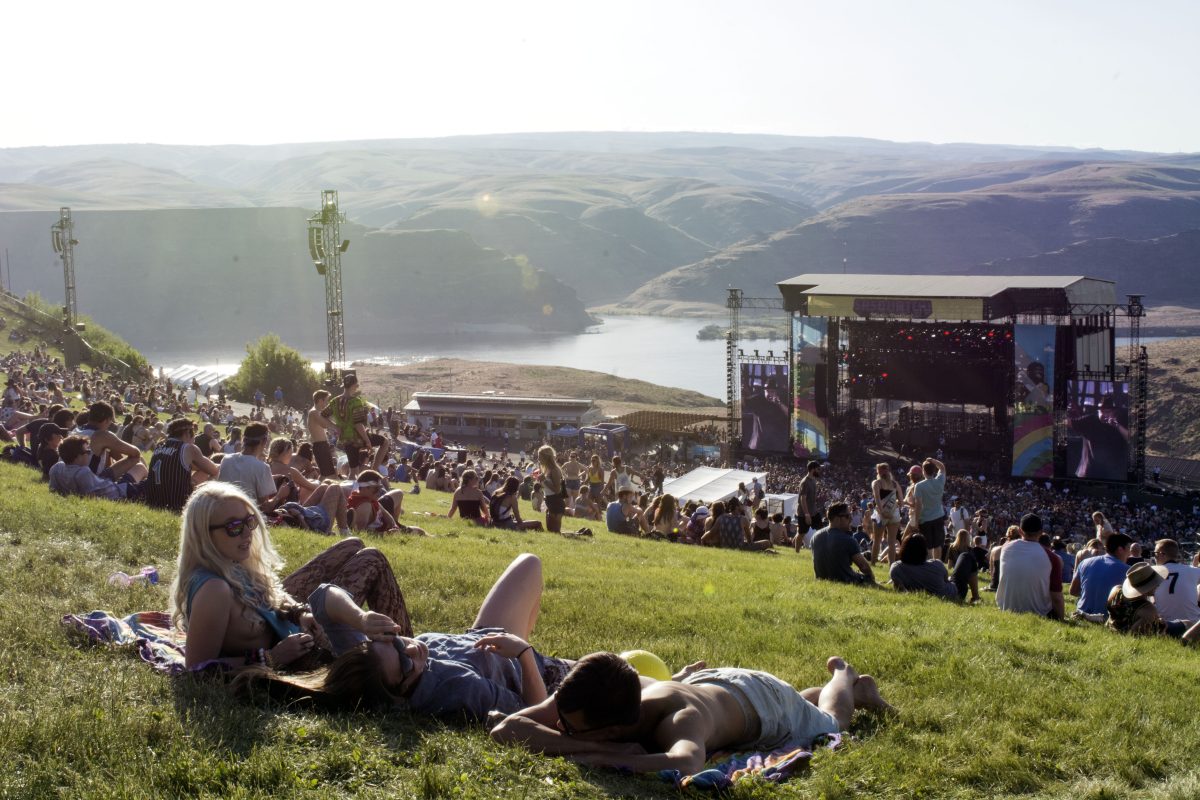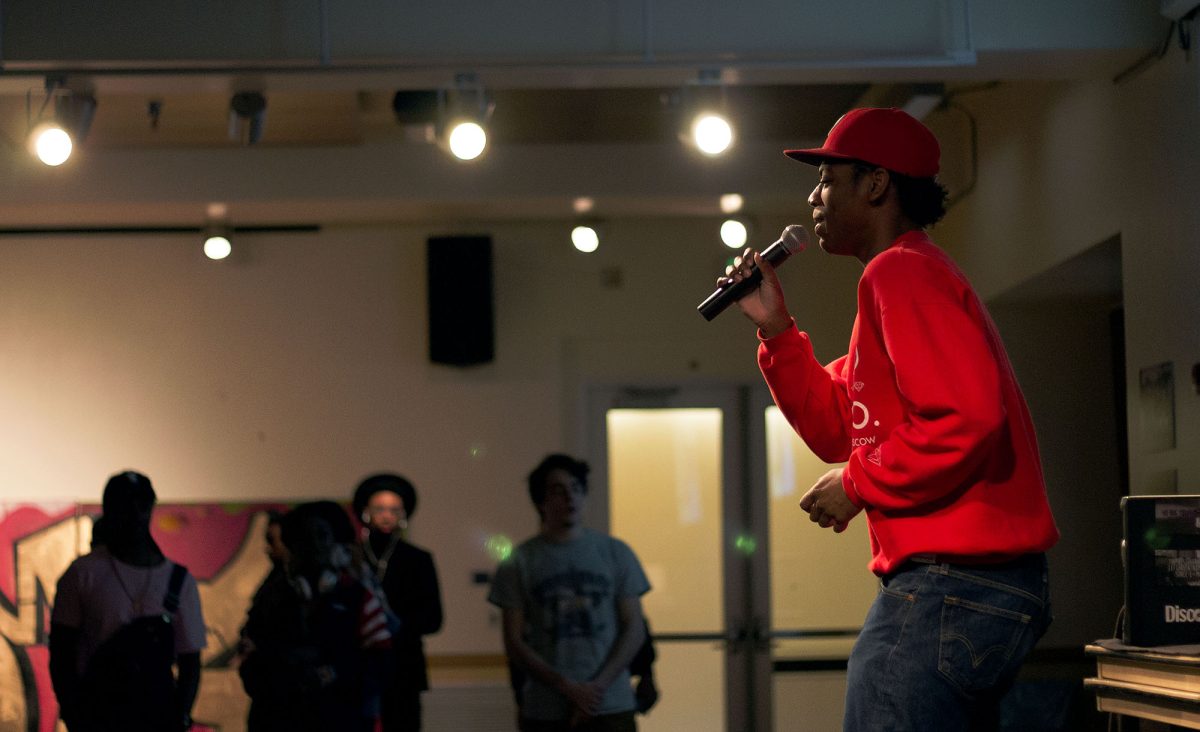Story by Hannah Everman
Photos by Brian Clifford
Multimedia by Eli Ouellette
Kyle Ward bounces back and forth on the balls of his feet, psyching himself up for the set he’s about to complete. The darkness of the arcade is illuminated by the games’ flickering lights and the brief flashes of sunlight that dart in as people walk through the doors of Big Al’s arcade in Vancouver, Washington.
Ward steps onto the tri-colored pad of Pump It Up Pro 2, an interactive game that requires players dance to earn points. After Ward pays for a round, the screen lights up with a list of hundreds of songs. He scrolls through each one as the timer counts down until Ward has only seconds left to choose his soundtrack. Finally, he picks a fast-paced number. Gripping the bar behind him, Ward gets ready for the music.
Once the song starts, Ward taps his feet in sync with the arrows blinking up on the screen, gaining speed as the game moves along. Sweat begins to drip down his face. Ward jumps in the air and does handstands, using both his hands and feet to tap the arrows beneath him, racking up points for every perfect hit. “Excellent!” shouts a robotic voice from the machine. For Ward, playing dance games such as Pump It Up Pro 2 and Dance Dance Revolution (DDR) isn’t just a passion. It’s a way of life.
Ward first became interested in dance games in 1999 while working at eln Communications, a digital media company in Seattle, Washington.
“One of the reasons I started playing DDR was because I really liked the music,” he says. Music has always been a passion of Ward’s, especially the electronic beats of dance arcade games. His interest grew until eventually he began working on a game called In the Groove. “After that, it turned out to not just be a hobby, but a profession,” he says.
Currently, Ward is the president of Step Evolution. Founded in 2010, the Washington company specializes in the development of interactive gaming products including a video game called ReRave.
“The best feeling is when you work on a project and three years later, you see people playing the game and know that they’re having fun,” he says.
Besides the music, Ward loves the social side of the arcade. “There is a different atmosphere that makes you appreciate the game and the people more,” he says.
Back at Big Al’s and done with his set, Ward watches his friends, Kristina Proctor and Jeremy Cash, dance “doubles” on Pump It Up Pro 2. Proctor stands on the left; Cash on the right. As the song speeds up and the steps get more complicated, the two alternate positions, switching back and forth and laughing as they maneuver around each other’s feet. Ward, Proctor, and Cash have been dancing together and introducing others to the dance game industry for years. “I’ve met a lot of people playing these games and we’re still friends to this day,” Proctor says.
Ward worked on the original Pump It Up Pro and helped line up an opportunity for Proctor to work on the sequel. Pump It Up Pro 2 was released in summer 2010; Proctor frequently visits Big Al’s to play the piece she helped create. “Seeing it done is a big satisfaction,” she says. “It’s nice to see something you worked really hard on come to fruition.” Although Proctor currently has a day job at an office, she hopes to work on another arcade project in the future.
Like Ward, Proctor originally became interested in dance games in 1999. One of her friends talked her into playing DDR. “I was afraid of looking dumb, but I tried it anyway,” she says. After her first game, she was hooked: “All my life I’ve loved video games. When there were arcade games with music combined with something physical that was even better for me because I love music, I love competition, and I love people.”
As the song ends, Proctor scans the list for the next beat. Her dance partner, Cash, inhales and exhales slowly, doing some stretches to get his muscles loosened up.
“From the get-go, for me it was more about the workout because I despise the treadmill,” he says. “When I figured out that this is extremely good cardio and it’s fun, too, it just gave me the drive to keep going.”
Cash came to Big Al’s for the first time four years ago to play the arcade version of DDR. Impressed by the new guy’s fast footwork and persistence, Ward immediately saw the potential Cash had to play Pump It Up Pro.
“Kyle ended up dragging me over to Pump It Up for the first time, where I basically had to start over again on the lowest level,” Cash says. “But my competitiveness and my drive wouldn’t accept that I was that bad at it. I ended up coming in day after day and getting better at a really fast rate.”
Soon after, Cash was offered a job at Big Al’s, where he helped host the most recent Pump It Up Pro 2 tournament. Twenty-four people participated, an increase of four from the previous tournament. “I’m trying to make the community larger, by seeing people who like to play a little bit and pushing them to get better and come in more often,” Cash says. “The goal is to have other people share this passion.” Cash has become so involved with the gaming lifestyle that he had the signature Pump It Up Pro 2 arrows tattooed on his right shoulder, colored in blue and red.
Cash’s co-worker and Big Al’s arcade manager, Jose Vazquez, sees people with all levels of experience come in to show off their speed and footwork. Inspired by their enthusiasm for the games, Vazquez began scheduling dance arcade tournaments at Big Al’s every several months, hoping to increase people’s awareness of the sport. “I want to get people excited about it,” he says.
After 15 minutes of dancing, Cash and Proctor step off the platform, barely noticing the small group of fascinated kids that had gathered to watch their moves. The two dancers breathe heavily and smile at each other. A few of the onlookers tug at their parents’ hands for permission to give the machine a try. Some even climb up on the pad, gingerly tapping the arrows with their hands, inspired by the action they’d just seen. Cash and Proctor look on as the kids choose their songs, happy to pass on their love of dance games.
Categories:
Arcade Fever
June 4, 2012

Arcade Fever
0
Donate to Ethos
Your donation will support the student journalists of University of Oregon - Ethos. Your contribution will allow us to purchase equipment and cover our annual website hosting costs.
More to Discover














